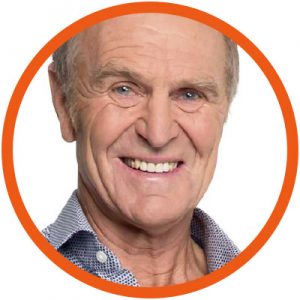 Special Guest Blogger:
Special Guest Blogger:
Graham Cornes
Media Personality & Former Crows Coach
I can’t remember the exact year but it was in the early ‘90s when the ANZAC Day march still wheeled from Franklin Street into King William Street.
I was standing on the corner by the GPO watching – just watching.
I’d been home from Vietnam since 1970 but had never marched.
Like many Vietnam veterans and National Servicemen, I’d never felt worthy.
The amateur psychologist in me says it was probably the persecution or inferiority complexes that many Vietnam vets suffered.
However as my old unit, the Seventh Battalion of the Royal Australian Regiment marched past, a remarkable thing happened.
One of the boys saw me, broke ranks, waded into the crowd and dragged me out into the group.
It was the first time I’d marched, and although not completely comfortable, I found a certain level of fulfillment at the end.
Then an even more remarkable thing happened.
At the end of the march, my mate came up again and said: “I listen to you on the radio, and you need to see someone because you’re suffering”. He was as blunt and as bold as that.
I’d taken some pride that I’d been able to return from Vietnam and resume a life in football, business and eventually, in the media without the trauma that so many others had endured.
The moment I stepped off the plane from Saigon, the Glenelg Football Club and its coach Neil Kerley, had provided stability, opportunity, discipline and purpose. I was one of the lucky ones. “Nah, I’m fine”, was my initial response.
However, he was persistent. “How do you sleep at night? How many marriages have you had? How do you react to authority? How aggressive are you when provoked?” The last question had the most impact: “Do you have recurring memories (flashbacks) from your time in country?” Indeed I did – those hands, that head, the jammed M60 machine gun. But they are stories for another time.
I could never admit that I needed help or that I needed to see a psychiatrist or a psychologist. Aussie men particularly, see it as sign of weakness. In fact it’s the opposite. It takes a certain strength to admit there is a problem and to seek help for it. We can see the physical wounds but it’s so easy to disguise the psychological ones for fear of being stigmatized.
However, there should be no stigma attached to mental illness be it depression, post-trauma stress or anxiety.
Increasingly more public figures and sportspeople are confident enough now to admit their struggles with mental health. In doing so they make it much easier for the rest of us to admit our difficulties and seek help for them.
The first step should always be your family doctor. He or she will know what to do and where to send you.
In my immediate family, we’ve dealt with it several times. My son Kane outlined in his recent book the battles that he has had with depression and anxiety. He is a premiership player, four time club champion, twice all-Australian and AFL life member yet there were times when he could not bear to step outside the door. His club doctor performed miracles.
My wife Nicole dealt with both pre and post-natal depression with our third child, child sexual abuse accommodation syndrome, as well as a brutal election campaign when she stood for parliament. Her mental health suffered but our family doctor, once he knew of the conditions, knew how to help her.
The point is you are not alone. There is no shame in admitting you have a problem.
The professionals know how to help you and that does not mean blindly numbing you with drugs. There are many alternative strategies that are therapeutic and effective. But someone has to know. You can’t keep it to yourself.
If you don’t have an insightful mate like I did on that fateful ANZAC Day, just listen to those who are closest to you. And see someone!
By Graham Cornes
Media Personality & Former Crows Coach
Mental Health Week: October 8–14
Special Guest Bloggers

